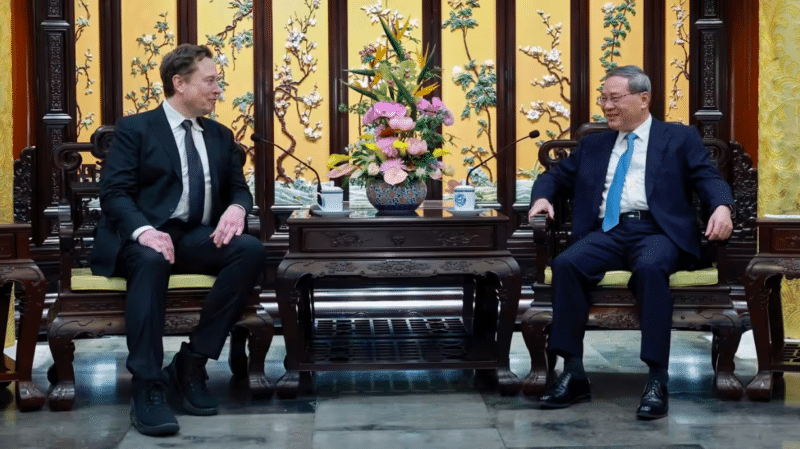Musk’s China trip ends with Tesla-Baidu partnership for FSD launch, Bloomberg reports
Tesla CEO Elon Musk surprisedly visited Beijing on Sunday, meeting Premier Li Qiang and spending less than 24 hours in China. As his trip concluded on Monday morning, Bloomberg reported that a mapping deal had been signed between Tesla and internet giant Baidu, sometimes dubbed China’s Google, clearing the regulatory way for the Full Self Driving (FSD) launch in China.
In China, all advanced driver-assistance systems (ADAS) must first obtain a mapping qualification to operate on public roads. Foreign companies must collaborate with domestic firms holding the license. Baidu is one of the dozen companies that has acquired this qualification.
When Musk arrived in Beijing, not Shanghai, where Giga Shanghai, responsible for half of Tesla’s global production, is located, speculations emerged about the purpose of the visit, as Beijing Auto how is undergoing in China’s capital. It turned out the discussions were focused on FSD approval in China and possible robotaxi services.
Baidu and Tesla began their partnership in early 2020, with Tesla already integrating Baidu’s navigation map, akin to smartphone apps, into its vehicles in China.
As Chinese law requires, all information collected by the Tesla fleet is currently stored locally in domestic data centers without being sent to an overseas HQ in the US.
A week ago, Baidu announced that Tesla vehicles will integrate Baidu maps in May. Collaborating with Baidu enables Tesla to overcome a significant regulatory barrier, granting access to data collection on China’s public roads.
In April, Musk teased on social media platform X that FSD may be available to Chinese customers very soon.
On Sunday, just before Musk landed in Beijing, the China Consumers Association (CCA) reported that Tesla, along with 76 models from six car companies, met all four data security requirements for automotive data processing, indicating that Tesla localization storage is complete.
If Tesla’s FSD is launched in China, it will face competition from local EV startups. Guangzhou-based Xpeng recently expanded its XNGP (Xpeng Navigation Guided Pilot) nationwide to all roads in China. It plans to make it available globally in 2025, as testing on European roads has already started.
In March, Nio made its NOP+ (Navigate on Pilot Plus) available throughout China, recruiting the first 100 testers. NOP was previously only usable on highways. Nio plans to bring its assisted driving software overseas.
Geely and Baidu (China’s Google) unveiled a new brand, Jiyue, last year, focusing on reaching L4 autonomous driving with their models, which include the Jiyue 01 SUV and the recently unveiled Jiuye 07 sedan. And Huawei is not behind with its Aito and Avatr brands, which offer various levels of advanced and autonomous driving systems called Huawei ADS.
Obtaining the mapping service license enables Tesla to legally deploy its FSD software on Chinese roads, allowing its fleets to collect data on road layouts, traffic signs, and nearby structures. The ownership of the collected data, whether it belongs to Tesla or Baidu, is not immediately apparent.



